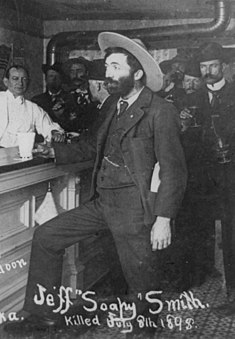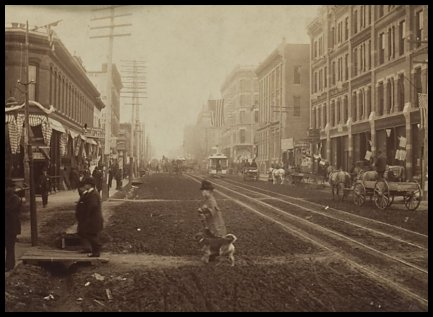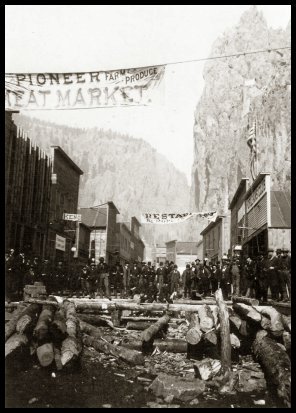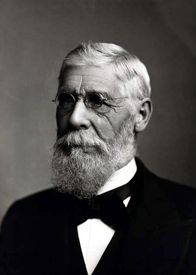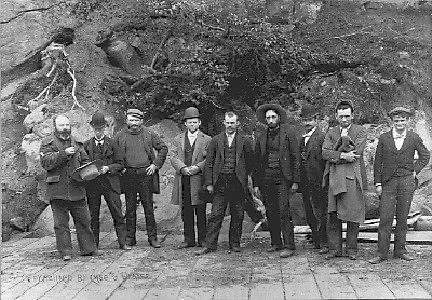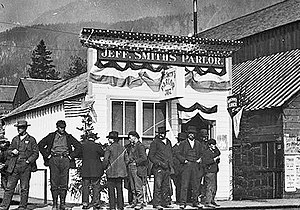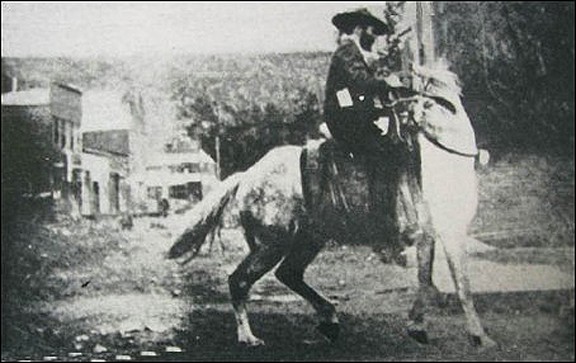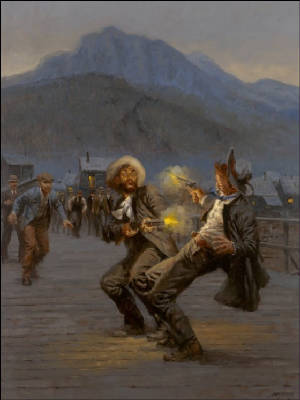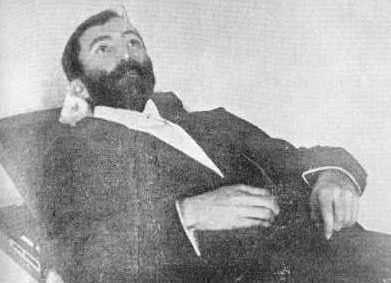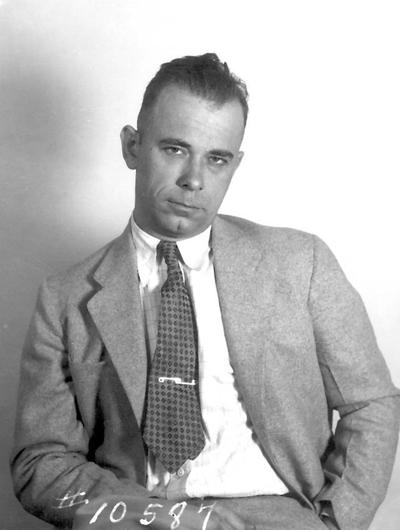
Dillinger
The most wanted man in the country following his escape from the Crown Point Jail, several bank robberies, and two shootouts with members of the Federal Division of Investigation (today's FBI), hiding in plain site after recovering from plastic surgery to remove three facial moles, eliminate age lines, change his fingerprints, and fill in the dimple in his chin (a $5,000 job, reacting to eating a full breakfast just an hour before and the ether fumes he is given as an anesthesia, the outlaw swallows his tongue and briefly stops breathing), Dillinger spends his last day on earth at the home he has hidden in since the 4th of July, the North Side apartment of a chunky forty-two-year-old divorced immigrant from Romania who becomes a prostitute and madam in America, Ana Sage (born Ana Campanas in the Black Sea village of Komlos), that she also shares with her unemployed son, twenty-three-year-old Steve Chiolak, and the bank robber's new girlfriend, a slim twenty-six-year-old brunette divorcee, part-time waitress (at the nearby S & S Sandwich Shop) and fallen angel, Polly Hamilton. Posing as a clerk at the Chicago Board of Trade named Jimmy Lawrence, Dillinger spends the morning in front of a roaring fan, reading the newspaper and thinking about the Monday meeting he'd scheduled with Homer Van Meter and Baby Face Nelson to discuss their next job, a Wisconsin train robbery (that would give the outlaws enough of a payday to flee the country), then when Polly comes home sick in the afternoon from her shift at the sandwich shop, he puts her to bed with fan air rushing over her and gets her ice cream from a nearby deli; feeling better later, the trio of Polly, and Dillinger have an early dinner of baking powder biscuits, mashed potatoes, greens, gravy, and fried chicken (a Dillinger favorite, but not the smartest meal to cook when its over 100 degrees), wash the dishes and put the plates away before playing pinochle. At about 8:30 in the evening, having made his decision on which gangster movie he wants to watch, Little Miss Marker starring Shirley Temple at the Marbro on West Madison Street or Manhattan Melodrama featuring Clark Cable, William Powell, and Myrna Loy at the Biograph on North Lincoln Avenue, the trio leaves the apartment and Dillinger points them around the corner towards the nearer of the two movie theaters on North Lincoln ... the group will be seeing MGM's Manhattan Melodrama.

Sage
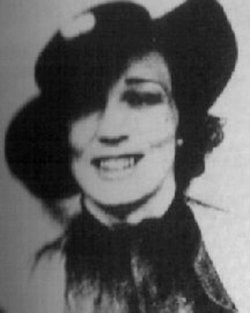
Hamilton

The Biograph
Walking the short distance to the theater, Ana is attired in a white blouse and orange skirt (that will appear red under the marquee lights of the theater), Polly is dressed in a white blouse, a tan skirt, tan hose, and white open sandals, while a dandy black mustached Dillinger (his hair has also been dyed black) is in a fresh pair of size 34 white Hanes briefs with blue stripes, a pair of lightweight grey slacks held up by a black belt with a silver buckle, black silk socks held up by red Paris garters, white buckskin Nunn Bush shoes, a white kenilworth broadcloth shirt, a grey tie flecked with red, and a pair of non-prescription clear glasses, all topped off by a white straw boater hat. In his pockets and on his person, Dillinger carries getaway money of over $3,000 (later at the morgue, thanks to a pair of greedy East Chicago cops, the sum will be subtracted down to $7.70 ... a five dollar bill, two singles, and seventy cents in change), wears a gold ring with a ruby stone, a La Corona-Belvedere Cuban cigar, keys to the apartment, a money clip, a gold pocket watch with Polly's picture inside attached to a gold chain with a tiny knife on it, a white handkerchief with a thin brown border, and in his right pants pocket, safety on, a fully loaded Colt 380 automatic pistol with an accompanying clip of extra ammo. Arriving in front of the theater at about 8:36, the presentation having already begun, Dillinger pays for everyone's admission, a whooping ninety cents, then escorts the women through a glass door to the right of the tiny ticket booth. Inside, cooled by air that is fanned over large blocks of ice and then pumped into the theater, Ana finds a single seat near the back of the Biograph, while Dillinger and Polly settle down in two adjacent seats in the third row, near the screen, and after a long kiss (and promises of more later), begin enjoying Manhattan Melodrama, the tale of two childhood friends who grow up to be on opposite sides of the law, and in love with the same woman, unaware that a host of killers have gathered outside. The feature is ninety-four minutes long, but with newsreels and trailers the entire presentation lasts two hours and four minutes, with egress from the theater falling at 10:35 if everything is watched.

Dillinger Before Plastic Surgery

Movie Poster
Pushed into the role of Judas Iscariot by the hope her help will halt her eminent deportation back to Romania as an undesirable personage, along with reward fever over a potential payout of $25,000 in reward money for delivering Dillinger, Sage has agreed to finger the outlaw, helped along by her lover of many years and sometimes business partner, corrupt East Chicago police detective, Martin Zarkovich (along with Captain Timothy O'Neil, there are rumors in the criminal underworld of Chicago that the pair set up the January bank robbery in which Dillinger kills detective Patrick O'Malley while escaping the job, have harbored a hiding Dillinger and members of his gang, and have sent detectives Martin O'Brien and Lloyd Mulvihill to their deaths at the hands of Homer Van Meter when they find out too much about the pair's corrupt deeds). On July 21, after requesting the outright murder of Dillinger by members of the Chicago police's Dillinger Squad, and being refused the day before by its captain, John Stege, O'Neil and Zarkovich convince new Chicago SAC (Special Agent in Charge) Samuel P. Cowley (a Mormon from Utah sent to Chicago after one too many mistakes being made in the hunt for Dillinger by the former SAC, Melvin Purvis; the latest being allowing Helen Gillis to lose her FBI tail and link up with her husband, Baby Face Nelson), and Melvin Purvis that they have a source willing to give information on the location and movement of Public Enemy #1 for considerations, Ana Sage. Later that night, with the head of the FBI, J. Edgar Hoover aware of the maneuverings of his agents (he will soon be receiving calls from Cowley in the library of his home in Washington D.C. as the plot to pinch Dillinger advances), in the company of Zarkovich and O'Neil, Sage meets with Purvis and Cowley at a secluded spot on the shores of Lake Michigan and tells the tale of Dillinger's time at her apartment, and of his probable plans to take her and Polly to a movie at the Marbro the following evening, and that she will call when the outlaw's plans become more definite.
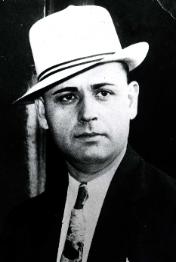
Zarkovich
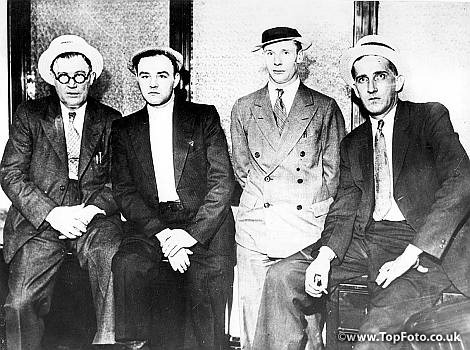
Captain Tim O'Neil At Left - With East Chicago Sergeants Peter
Sopsic, Walter Conroy, And Glen Stretch - All Will Be Present At
The Dillinger Killing
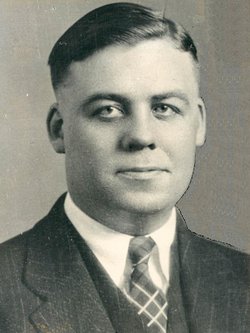
Cowley
Sunday morning the long wait begins as the take-down team begins assembling at the FBI headquarters on the nineteenth floor of the Bankers Building in downtown Chicago ... leaves and vacations are canceled ... in all, nineteen Federal agents will participate in the arrest, assisted by five members of the East Chicago police force. As the day advances and no call from Sage is received, the officers begun to believe the whole thing is just another false alarm in their hunt for the fugitive, those thoughts change however when Sage calls a little after 5:00 in the evening (slipping away after she claims to need butter for the fried chicken dinner she is preparing) and says Dillinger is at her apartment. Fast and cryptic in nature, she says again that she will let them know what movie they are going to when she knows. And again the men wait. At 7:15 they receive their next call from Sage, destination still unknown, Dillinger will either be taking in a movie at the Marbro, or mentioned for the first time, one at the Biograph. Immediately, Cowley sends two agents to reconnoiter this new possible destination. Shortly afterwards, everyone crams into Purvis's office for a final meeting ... Cowley introduces Zarkovich who talks about Dillinger's plastic surgery and what the two women who will be accompanying him look like, then Purvis tells everyone that Dillinger is wanted alive, but not to risk any of their lives accomplishing that goal. Still unsure which theater Dillinger is headed for, when the meeting breaks up, Purvis and Agent Ralph Brown (his pockets stuffed with nickels for calling in updates) head off to the Biograph, while Zarkovich and Agent Charles Winstead head to the Marbro ... Cowley will stay behind at headquarters taking the calls from both groups, ready to send the balance of the team to whichever site Dillinger chooses. And then more waiting takes place, until at 8:36, Purvis spots Dillinger and his two female companions at the Biograph box office, information which is quickly communicated to Cowley, and then on to Hoover.

Purvis
Nerves jangling not wanting his prey to escape again, Purvis buys a ticket for the show and goes inside, evaluating whether Dillinger can be taken from behind as he is engrossed in the movie, but in the darkness of the crowded theater, he can't even see where Dilinger is sitting, and that idea is quickly discarded. Returning outside, he asks the girl selling tickets how long the movie lasts and is given the information. After about twenty minutes, other agents start arriving and taking up positions around the theater and when Cowley shows up from headquarters with more men plans are finalized as to the teams positions on the street, and that the signal to close in on Dillinger will be Purvis lighting a cigar. By 9:30 all the players are in place, surrounding all the entrances and exits of the Biograph. Nervous, knees shaking, Purvis bites off the end of a cigar and chews on the tabacco, while twice more asking the ticket girl how long the movie is. She in turn reacts by telling her manager about about the man and how the street is full of men in suits despite the heat, wondering if the theater is about the be robbed. The information, coupled to a report from the employee responsible for the theater's cooling system that their are numerous men in suits in the alley behind the Biograph, causes the manager, Charles Shapiro to call the District 37 police station on nearby Sheffield Avenue. At 10:20 two squad car sedans show up in the alley and several men carrying weapons accost the agents in the alley ... the local police have arrived, and are soon sent on their way when the Feds say they are on a stakeout and require no assistance. Ten minutes later, three plainclothes detectives arrive out front and begin receiving the same information (they are still out front when Dillinger leaves the theater). Incredibly, whether worried about a leak taking place or the glory of a bust having to be shared, the Chicago police have not been told an operation to take down Public Enemy #1 is taking place in their city.
Dillinger Squad Leader - Captain John Stege
Inside the movie theater, Dillinger enjoys the movie immensely, taking special delight when his only career is referenced as the Blackie Gallagher character played by Cable tells district attorney William Powell why he shouldn't be invited to his friend's wedding, "Remember what happened to the district attorney in Chicago just for having his picture taken with some gangsters having dinner." Unaware of what is waiting outside, he also sees his fate put into words as Cable is led off to his execution, "Die the way you lived, all of a sudden. Don't drag it out. Living like that doesn't mean a thing." Movie over, Dillinger tells Polly he really liked the film, remaining briefly in his seat to let the experience wash over him. House lights on, he and Polly then make their way up to where Ana has watched the film. Hat back on, Polly takes Dillinger's left arm as they leave the theater, while Ana stays to the right and slightly behind the outlaw. Turning to their left, only a few feet away, the trio walk by Purvis standing in the doorway of the Country Club Tavern where hunter and prey make brief eye contact. Cigar shaking in his mouth, Purvis lights up and everyone begins closing in on Dillinger. For a few steps the outlaw is unaware of his danger, but then something alerts Dillinger and he tenses, glancing around the street. Making a quick decision, he decides his best escape route will be up the alley and in the blink of an eye, he moves away from Polly and Ana, moves in that direction as if ready to break into a sprint, and pulls the automatic from his pocket. A wasted effort, as his pulls his pistol six shots ring out, all sent in his direction. Agent Charles Winstead fires three times, Agent Clarence Hurt fires twice, and Agent Herman Hollis fires once Four of the shots hit the outlaw, two creating only grazing wounds, one, going through his chest at a sideways, downward angle and punching out of his body beneath the left rib, and a fatal round that rips into the base of Dillinge's neck, mangling a vertebra as it severs his spinal cord, before going through his brain stem and exiting out of his cheek, just below his right eye (in a return to the trigger happy times of the Little Bohemia Lodge raid, two innocent bystanders, Etta Natalsky and Theresa Paulus, are also struck ... Natalsky in her upper left thigh and Paulus in the hip). Dead on his feet, Dillinger spins, staggers forward, and falls into the alley, shattering his eyeglasses and snapping the brim of his straw hat. The Jackrabbit will be running no more
Winstead
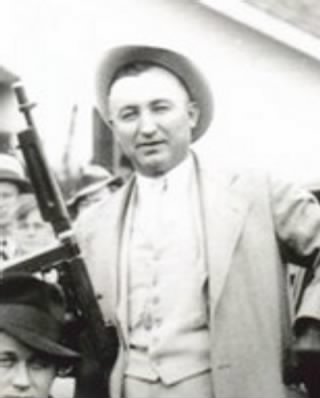
Hurt
Hollis
For a moment there is silence at the scene, then the area becomes a circus of citizens screaming, yelling, dancing, posing for pictures and trying to get as close to the corpse as they can (meanwhile, Ana and Polly slip away, return to the apartment, and then throw their former roommate's sub-machine gun, pistol, ammunition and a bullet proof vest into Lake Michigan), some dipping articles of clothing into the bank robber's blood, with members of law enforcement trying to keep a modicum of control over the situation as word quickly passes around the mob, "THEY GOT DILLINGER!" Local police informed, Hoover called by Cowley from inside the Biograph, soon the world is aware and the news will be the front page story around the globe the next morning. Alley cleaning begun almost immediately, accompanied by five Federal agents and three members of the Chicago police, the corpse is put on a stretcher and driven to the Alexian Brothers Hospital, where it is laid on the lawn until Dr. Walter Prusaig comes outside, puts a stethoscope to Dillinger's chest and pronounces the obvious, "This man is dead." It is 10:55 in the evening. The body is then transported to the Cook County morgue on Polk Street where another circus begins of law enforcement agents and citizens all gathering to see the famous outlaw in repose (Dillinger's old nemesis, Sgt. Frank Reynolds of the Dillinger Squad will take the opportunity to shake the body's hand). Put in an elevator and brought down to the basement, Dillinger receives an autopsy from Dr. Charles D. Parker (who is also a newspaper reporter)and Dr. Jerry J. Kearns, is prepped for burial, and under the supervision of Professor D. E. Ashworth, five students of a Chicago embalming class are allowed to make plaster death masks of the former desperado.

Circus
Transport
Dillinger's Blood
How Not To Conduct An Autopsy
Making A Death Mask

Death Mask

Toe Tag Blues
The Ghouls Have A Look
Born in Indianapolis, Indiana on June 22, 1903, the celebrity criminal is thirty-one-years-old at the time of his death outside the Biograph Theater..
Dillinger
